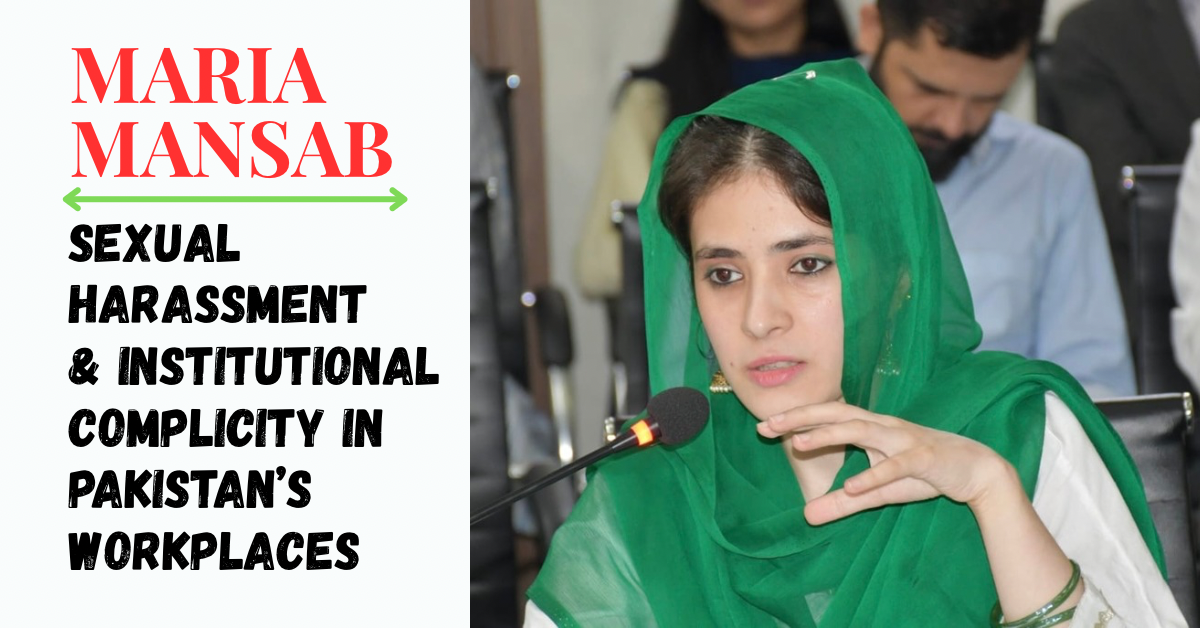The Pakistan Supreme Court has recently delivered a landmark ruling, asserting that a safe working environment is a fundamental right of all citizens, regardless of their gender. Written by Justice Mansoor Ali Shah, the judgment identifies workplace harassment as one of the most potent drivers of gender discrimination, particularly in a nation that ranks 145th out of 146 countries on the Global Gender Gap Index. But under this influential ruling lies a darker reality, one of deep-rooted institutional silence, uncurbed misogyny, and routine betrayal of women by the very institutions that are supposed to safeguard them.
A disturbing reflection of this surfaced in the case related to the Institute of Business Administration (IBA). A harassment complaint by a former lecturer, Zahra Sabri, against the registrar of the university for inappropriate and unprofessional comments was filed in January 2023. An internal inquiry committee deemed the complaint valid and suggested that IBA provide a written apology to her and compensate her Rs300,000. Instead of adopting these recommendations, IBA refused to comply and challenged the ruling before the Sindh High Court, which has stayed enforcement of the ombudsman’s order until the petition is resolved.
This trend, of denying, deflecting, and defending the accused, is no new. Indeed, it is a familiar tale in Pakistan’s professional arenas. A close friend once shared with me a terrifying experience she had at a well-known think tank. Her married superior, a senior official with influence and power, abused his authority to make inappropriate advances toward her. He didn’t just proposition her, but he also attempted to get her to reveal his sexual orientation, a personal and inappropriate question that had no business being asked in the workplace. Her intelligence, confidence, and professionalism were not viewed as strengths, but as invitations.
A Dawn survey of 300 working women revealed that Most women had little trust in internal reporting procedures. Most feared, no action would be taken against harassers, particularly those with institutional support or influential connections. They are dismissed as liars, as drama queens, or as troublemakers. They are denied promotions with dubious explanations like being “not committed enough” or “too emotional,” and others are simply pushed out quietly, their reputations tarnished simply for daring to speak up.
Pakistan’s Protection Against Harassment of Women at the Workplace Act (2010) and the reformed Section 509 of the Penal Code establish a legal context to deal with harassment. These statutes are aimed at providing redressal by way of internal complaint procedures instead of criminal courts. But their effectiveness is restricted since institutions tend not to take them seriously. Most organizations lack effective anti-harassment committees, and even if they have them, the authority to act remains with senior leadership, the same individuals who might wish to cover up the truth.
In the IBA case, the institution’s choice to defy implementation of the ombudsman’s verdict illustrates just how deeply rooted this resistance to accountability is. This is no longer a matter of a single registrar or an in-house committee; it’s about an institution deciding to defend its reputation at the expense of the dignity of its employee. And this is exactly how harassment is made to endure: through complicity, silence, and abuse of authority.
The reality is straightforward but brutal: Sexual harassment in Pakistan isn’t about desire, it’s about control. It’s about dominating men pushing limits, taking advantage of silence, and misusing systems rigged in their favor. When a woman says no, they get around it and punish her for it. And when she tries to get justice, they get around that too and silence her.
The Supreme Court’s decision brings with it a glimmer of hope. But for change to happen, these statements must address the daily practices of boardrooms, classrooms, and government offices nationwide. Justice begins when powerful institutions stop shielding the powerful and start standing with the truth.

